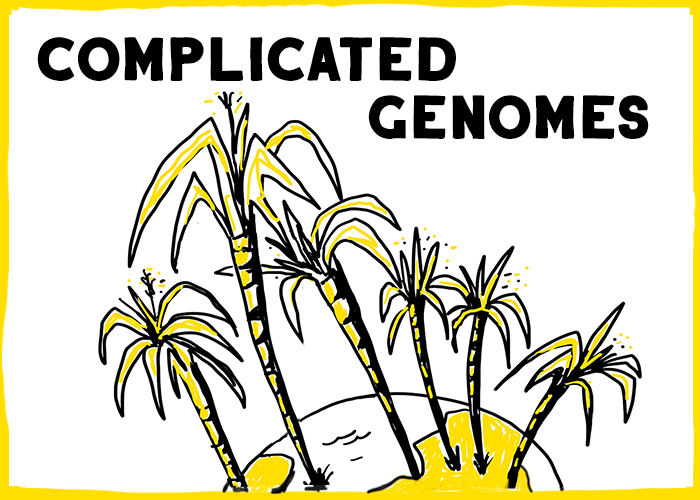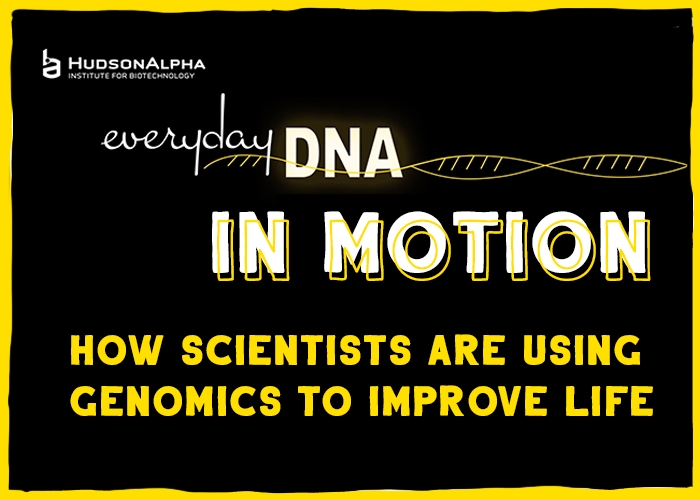An Everyday DNA blog article
by: Sarah Sharman, PhD, Science writer
 We are in the midst of a genomic revolution that is greatly advancing the diagnosis and treatment of many diseases and conditions. However, not everyone is reaping the benefits of this life-changing technology. Genomic research and clinical trials are largely based on participants of European descent. This means important discoveries and breakthrough treatments could be ineffective or even unsafe for people of color and other minorities.
We are in the midst of a genomic revolution that is greatly advancing the diagnosis and treatment of many diseases and conditions. However, not everyone is reaping the benefits of this life-changing technology. Genomic research and clinical trials are largely based on participants of European descent. This means important discoveries and breakthrough treatments could be ineffective or even unsafe for people of color and other minorities.
Increasing the diversity among genomic research participants is important to help scientists better understand and predict the risk of certain diseases for everyone in our continually diversifying world. In keeping with the theme of this year’s Black History Month, Black Health and Wellness, let’s learn about some of the reasons that Black Americans lack representation and participation in genomic research and how research organizations are helping to make genomic research more inclusive.
Why are genomic databases so white?
Despite efforts to increase diversity in genomic research, only marginal progress has been made toward meeting the goal. There are many reasons why minorities, especially Black Americans, lack representation and participation in genomic research. Three main factors that deter minorities from participating in genomic research include mistrust in medical research, skepticism of data privacy protection, and lack of access to genomic research trials.
Deep-seated mistrust in medical research
Medical research and healthcare in the U.S. have had a long and troubled racial history. There are countless examples of African Americans being exploited, experimented on, and abused in the name of research throughout the years. Throughout the 18th and 19th centuries, doctors used enslaved peoples and infants as test subjects for experimental procedures, many of which were fatal. Fear of medical practices and procedures was born out of these horrifying experiences that African Americans and their families endured.

Further distrust in medical research emerged in response to historical events like the Tuskegee Syphilis Study in which Black American men were denied treatment for syphilis in order to advance a research study, despite penicillin being discovered as an effective treatment. More than 128 participants died of syphilis or related complications, 40 wives were infected, and 19 children were born with congenital syphilis as a result of the medical neglect in the study.
The story of Henrietta Lacks also increased skepticism in the intentions of biological and genomic research. The very doctors that Mrs. Lacks entrusted to diagnose and treat her cancer, collected her cancer cells without consent and went on to financially benefit from the extraordinary cells that could reproduce almost indefinitely. The doctors took advantage of the fact that they were one of the few hospitals that treated poor Black Americans at the time and unethically collected samples from hundreds of patients.
Concern about the use of genomic data
Many minorities are skeptical to give consent to allow their DNA to be released to large research databases because they fear the data could be used in studies that go against their beliefs or morals. The distrust in research purposes is justified based upon historical events like the Tuskegee Syphilis Study and the Havasupai Tribe lawsuit in which DNA samples from tribe members were used for genetics research outside of what they had initially consented.
Privacy concerns surrounding genomic research are also of important significance to minority groups. The recent rise in the use of genetic data banks as a forensic tool for law enforcement raises questions about the potential for this tool to oppress minority groups. This is enough to provide disincentives for some minority populations. There is also a concern that data collected from genomic research could discriminate against individuals in employment and insurability.
Lack of access to genomic technology and research trials
 Racial inequities are still embedded in U.S. research and healthcare systems today. More recent events like the HIV/AIDS epidemic and the coronavirus disease (COVID-19) pandemic illuminate systemic inequalities impacting black American communities, including access to healthcare and economic disparities.
Racial inequities are still embedded in U.S. research and healthcare systems today. More recent events like the HIV/AIDS epidemic and the coronavirus disease (COVID-19) pandemic illuminate systemic inequalities impacting black American communities, including access to healthcare and economic disparities.
A 2019 study reviewing over 150 genomic studies suggests that racial and ethnic disparities in American health care may be a consequence of provider and institutional bias. Individuals within specific racial groups are more likely to become sicker, suffer longer, and even increase their mortality rate with certain health conditions just because of their race.
Black Americans are underrepresented in clinical trials for many reasons including failure to meet the enrollment criteria, failure of researchers to actively recruit black Americans, and lack of knowledge of clinical trials. In addition, hospitals and clinics in rural and underserved communities often do not have access to the sophisticated technology or staff necessary to conduct research trials, thus leaving these communities without the option to even participate and be represented.
How are researchers increasing healthcare access and research representation?
Genetic databases that lack representation from minority groups lead scientists and doctors to diagnose conditions or prescribe treatments that might be relevant to people with European ancestry, but not for people from other backgrounds. For example, because genetic tests are based mostly on people of European descent, they are less accurate for people from other ethnic groups. Along the same lines, algorithms that help doctors prescribe the correct amount of a drug for an individual patient work well for people of European descent but are far less accurate for black individuals.
Scientists and clinicians must acknowledge hundreds of years of mistrust in healthcare and genetics and work to gain the trust of the black community by engaging and educating them about the benefits of genetic research to their health. Researchers and leaders at the HudsonAlpha Institute for Biotechnology are dedicated to increasing diversity among genomic research participants, while also increasing minority access to genetic testing, education, and clinical trials.
Increasing access to genetic testing and education
Several HudsonAlpha researchers are involved in research initiatives to increase access to genetic testing for individuals in rural and underserved communities. Enrolling participants in these studies also contributes meaningful genomic data from black Americans that helps create a more complete picture of human genomics. The Alabama Genomic Health Initiative (AGHI) and SouthSeq research study both aim to increase access to genetic information for racial and ethnic minorities as well as those from rural, medically underserved areas.
Similarly, HudsonAlpha’s Information is Power Initiative offers free or reduced-cost genetic tests that look at several dozen genes associated with increased risk for breast, ovarian, colon, and endometrial cancers. Originally focusing on north Alabama, the initiative recently expanded its reach to individuals throughout the state, forging collaborations with #NowIncluded and Montgomery area physicians to increase their reach to more medically underserved areas.
HudsonAlpha’s Office of Diversity, Equity and Inclusion is also helping to build relationships in the black community throughout Alabama, offering information on health and wellness topics that directly affect them. Throughout the Covid-19 pandemic, Dr. Darrell Ezell and his team hosted virtual community awareness roundtable discussions that focused on COVID-19 prevention, community engagement and mobilization, and vaccine hesitancy, confidence, and allocation. The goal of the series, called A Path Forward, is to provide broad community awareness and education on issues related to genomic health, testing, health disparity, and improved access for minority populations.
Increasing diversity in clinical trials
HudsonAlpha associate company Acclinate Genetics strives to achieve health equity and personalized healthcare for all by diversifying genomic data and clinical research. The company helps bio-pharmaceutical companies and contract research organizations achieve the most representative research sample by expanding their genomic studies and clinical trials to include diverse ethnic groups.



